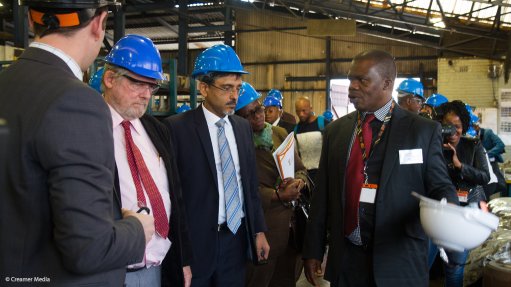
Rob Davies, Ebrahim Patel and Sibusiso Maphatiane on the factory floor at Guestro Casting & Machining
Photo by: Duane Daws
Government was aware of the complaints surrounding the lack of progress in ensuring localisation in Transnet’s locomotive procurement programme, Trade and Industry Minister Dr Rob Davies said on Monday. However, he gave an assurance that there was a plan, as part of the latest Industrial Policy Action Plan (Ipap 2016), to achieve “minimum local content of 55%, rising to 85% in different rolling stock classes”.
Speaking on the factory floor of Guestro Casting & Machining, in Benoni, where the black-owned company made components for the rail sector, Davies said the “story of rail localisation is a good story, but also one with challenges”.
He spoke after Guestro executive chairperson Sibusiso Maphatiane lamented the lack of progress in ensuring the State-owned enterprises (SoEs) honoured their local-content commitments, which followed media reports suggesting that some of the four original equipment manufacturers (OEMs) contracted to supply locomotives to Transnet were failing to live up to their commitments.
In fact, Maphatiane used the opportunity of hosting the Ipap 2016 launch at his factory, to point out Transnet’s lack of progress in living up to government’s commitment to raising levels of local content.
“If the SoEs could commit to what government is talking about, we would be fine.” However, as it was, the flow of orders had been slow.
Transnet had spread a R50-billion contract for the procurement of 1 064 new electric and diesel locomotives across four suppliers, including General Electric South Africa Technologies, China South Rail Zhuzhou Electric Locomotive, Bombardier Transportation South Africa and China North Rail Rolling Stock South Africa. The two Chinese companies have since merged.
However, despite railway rolling stock having been specifically designated for local procurement, the results had been mixed, with Rail Road Association CEO Bongani Mankewu telling Engineering News Online recently that there was a “misalignment” between policy instruments designed to raise levels of local content in the sector and actual outcomes.
Business Day reported, meanwhile, that the South African Bureau of Standards has not yet received satisfactory information from some OEMs to enable it to complete a local content verification of the Transnet programme.
Davies said initiatives were under way to “smooth out” the problems, adding: “You can take it for granted, that localisaiton and the achievement of those targets, is a fundamental objective of government as a whole”.
In fact, the Department of Trade and Industry was planning to introduce a sector-specific incentive to support the domestic production of rail components and to ensure that local manufacturers were integrated into the supply chains of rail OEMs.
“By using a combination of policy instruments, working closely with Transnet and with private sector companies, we have already taken considerable steps towards rebuilding our rail sector industrial capabilities. At the present time, the supply chain supports 14 000 jobs and many supply companies have not only rebuilt their fabrication capabilities but developed niche capabilities in high value and complex systems such as traction and propulsion motors and bogie systems.”
Government, Davies added, would make every effort to secure compliance with the procurement law, including through making compliance an audit function.